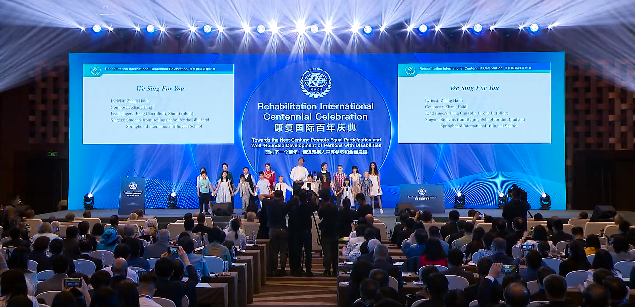'We Sing for You' performed for Rehabilitation International's centennial
- By Wang Yanfang
 0 Comment(s)
0 Comment(s) Print
Print E-mail China.org.cn, June 8, 2023
E-mail China.org.cn, June 8, 2023

"We Sing for You," a song written by Zhang Haidi, president of Rehabilitation International (RI) and chairperson of the China Disabled Persons' Federation (CDPF) in honor of RI's 100th anniversary, is sung by singers with China Disabled People's Performing Art Troupe and children from Beijing School for the Blind and international schools at the RI Centennial on May 21, 2023. [Photo provided to China.org.cn]
"We Sing for You," a song penned by Zhang Haidi, president of Rehabilitation International (RI) and chairperson of the China Disabled Persons' Federation (CDPF), in honor of RI's 100th anniversary was performed by singers with China Disabled People's Performing Art Troupe, children from Beijing School for the Blind, and pupils from international schools at the RI Centennial Celebration on May 21, 2023.
Zhang crafted the grand and enchanting song for the centennial. It was brought to life at the opening ceremony of the RI Centennial Celebration by performers Jiang Can and Zhu Li, as well as children with visual impairments and international students.
When discussing her inspiration for the song, Zhang expressed how deeply moved she was when thinking of the century-long history of RI, which further deepened over her eight years working there. She spoke of her admiration for her colleagues at RI and their enthusiasm for contributing to the international cause of people with disabilities.
Zhang has led the executive committee to many places in China, witnessing the progress made in the country's disability sector. She has also embarked on journeys to Africa to support children with disabilities there. She explained how RI's torch of love does not only illuminated the past and present lives of individuals with disabilities, but also promised to brighten the futures of many more.
Zhang noted that when she prepared for the celebration, RI's history constantly echoed in her mind as a melody. She felt compelled to transcribe it into a song and dedicate it to people with RI who have contributed to people with disabilities. Even if their names are not always remembered, their efforts should still be praised. The song, she said, serves to express gratitude and inspire those dedicated to RI's beautiful future.
The song, performed with a sense of history and a blend of global cultures, exudes a vision of hope for the future.
Jiang expressed the honor of contributing to producing and performing the song, which encapsulates profound gratitude from all people with disabilities to RI for its positive contributions to the global international disability cause over the past century.
Throughout the process of producing the song, Zhang directed the effort on-site, infusing the song with a humanistic mood.
An ancient violin, made in 1760, played a moving melody of birthday blessing during the song's violin solo, symbolizing the song's special historic background and spiritual connotation.
Zhu felt excited to sing a song written by her childhood idol Zhang Haidi. Zhu said that although she is visually impaired, she felt lucky to be born in an era of equality and inclusion. She hoped her singing could convey the humanistic spirit of RI to the world, expressing deep gratitude to all those with love in their hearts.
Zhang said that music can help individuals experience the beauty and hope of life, and help people with disabilities dissolve their pain and sadness. On the journey ahead, music can give us hope.
Zhang has written several songs for the China Disabled People's Performing Art Troupe and the theme song for the Beijing Winter Paralympics: "Amid the Beautiful Ice and Snow."






Go to Forum >>0 Comment(s)